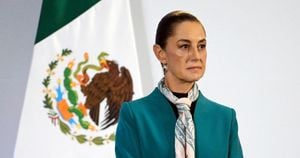Political tensions have reached unprecedented heights in the Philippines following alarming statements made by Vice President Sara Duterte, who openly declared her intentions to arrange the assassination of President Ferdinand Marcos Jr. if she herself were to face violence. This shocking admission has triggered widespread condemnation and security concerns within the government, putting the longstanding political relationship between the Marcos and Duterte families under intense scrutiny.
During an online press conference, Duterte claimed responsibility for instructing someone to assassinate Marcos, his wife Liza, and House Speaker Martin Romualdez, who is also related to Marcos. Her comments have not only provoked immediate backlash from the president but have also resulted in the Department of Justice stepping up investigations against her.
President Marcos addressed the nation shortly after the statements emerged, stating, "If it is so easy to threaten the life of a president, how much more so for ordinary citizens?" He criticized the vice president's comments as reckless, labeling such threats to public officials as intolerable. He pledged to respond firmly to any attempts against his life, emphasizing the need for accountability on such serious matters.
Duterte's controversial remarks came at a time when she was already facing legislative investigations concerning her management of government funds. These investigations have been contentious, leading to her resignation from her cabinet position and increasing tensions between her and the Marcos administration. Traditionally, the two families have had significant collaborative political legacies, but recent developments suggest deep cracks formed within this alliance.
The National Security Council reiterated the seriousness of the situation and stated, "The safety of the president is not just a political concern; it is one of national security." They emphasized the need for thorough investigations to address the threats and maintain order within the political sphere.
Legal action is imminent. Justice Undersecretary Jesse Andres indicated plans to subpoena Duterte to provide explanations and face potential consequences for her aggressive declarations. He classified the situation as a dangerous precedent for political discourse within the country, stating it sends the wrong message about the acceptance of violence among high-ranking officials.
Vice President Duterte has since attempted to mitigate the fallout from her statement, claiming her words were taken out of contextual meaning and emphasizing her concerns for personal safety. Her attempt at clarification, nevertheless, has largely failed to quell the uproar surrounding her comments.
This incident has inevitably drawn parallels to historical events back to the 1983 assassination of former Senator Benigno Aquino Jr., which significantly altered the political landscapes and led to widespread civil unrest culminating in the People Power Revolution. Duterte referenced this tragic chapter of Filipino history, pointing fingers and insinuations directed at the Marcos family, seeking to generate public support against perceived threats from the current administration.
Political analysts believe this bitter feud inevitably destabilizes the Philippines political condition, raising fear over the future of governance and democratic processes. The forthcoming days promise to reveal more about how Duterte’s remarks and subsequent investigation could impact the political stability of the nation.
Members of Congress have expressed alarm over Duterte’s statements. House Speaker Martin Romualdez criticized the threats vehemently, reinforcing the idea such expressions of violence are wholly unacceptable no matter the political standings. “Violence should not be tolerated as it breeds chaos,” he said, underlining the tone of unease pervading the country’s political atmosphere.
The revelations denote more than just political rivalry but also evoke concerns over the prospect of political violence as a means to resolve disputes among the nation's leaders. With investigations ramping up and political fallout continuing, the Filipino populace watches closely, anticipating actions and narratives from those they place their trust in.
Overall, the escalated tensions portrayed by the Marcos-Duterte factions signal more than personal vendetta; they are reflective of entrenched legacies, fraught rivalries, and the continuing challenges of governance posed by personal conflicts within the highest ranks of leadership. The Philippines remains poised at the brink of political upheaval, with history serving as both witness and participant.



